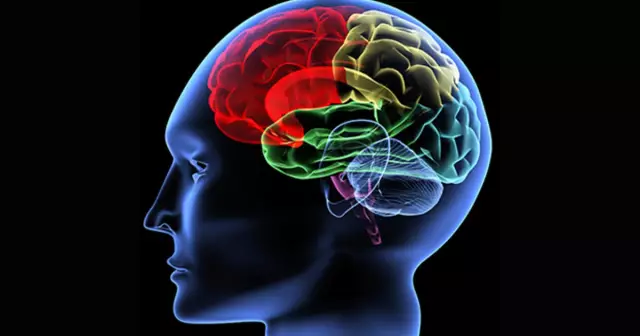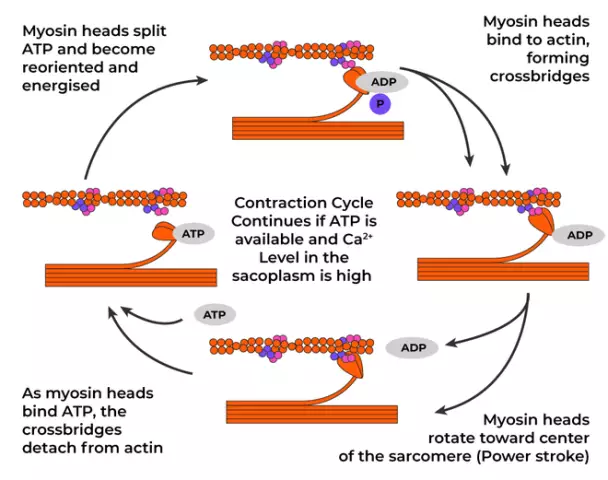- Author Rachel Wainwright [email protected].
- Public 2023-12-15 07:39.
- Last modified 2025-11-02 20:14.
The most common mental disorders

When it comes to a mental disorder, people usually imagine a disheveled person with an insane wandering gaze, performing actions that defy any logic. However, in reality this is not entirely true. The most common mental disorders do not have vivid manifestations for others, and their owners themselves often do not even suspect that they need specialized help, if not in a psychiatric hospital, then at least in the chair of a psychotherapist. Psychiatrists have compiled a kind of rating of the most frequent mental deviations affecting our contemporaries.
Chronic Fatigue Syndrome (CFS)
It is a borderline state between health and disease. It is characterized by nervousness, insomnia, emotional instability and feelings of hopelessness. A peculiarity is that having made a step towards the direction of the disease, the patient can receive, in addition to neurosis or psychosis, any somatic disease - as you know, it breaks where it is thin, and a problem arises with what there is a predisposition to. This state differs from ordinary fatigue in that a person can no longer help himself, simply having properly rested.
Breakdown
The human psyche is able to endure significant loads without harm to itself, provided that they alternate with relaxation. If there is a load for a long time, but there is no rest, a nervous breakdown occurs. Its manifestations are diverse, but the name speaks for itself: a person's nerves cannot stand it, and he begins to break down at everyone and everything, to commit rash acts that he would never allow in a normal state. A nervous breakdown is a very dangerous condition, as it can be the starting point for a more severe mental illness.
Burnout syndrome
This disorder may seem frivolous to someone, because it is associated with professional activity, and it is just one of the aspects of life. But in fact, this disease, although it arises from the situation at work, has a negative impact on a person's entire life, leading to irritability, feelings of hopelessness, eating disorders, autonomic disorders, depression and personality changes. Burnout occurs in people whose jobs involve emotional involvement in their clients' problems. These are doctors, psychologists, teachers, social workers, client managers in large industries, etc. The disease is associated with the inability to defend their mental space and the inability to relax.
Post-dissertation syndrome
Another occupational disease associated with overstrain, only this time not emotional, but mental. The name of the syndrome suggests its cause: excessive prolonged effort, ending with the delivery of a responsible job. This is not necessarily a dissertation, the reason can be any important task that requires full commitment. The strength is given, and when the work is completed, the meaning of life is lost along with it. A person does not find a place for himself, does not know where to apply strength, apathy and a feeling of emptiness overtake him, and at the same time he does not take on a new business, fearing to relive the difficulties associated with it. In a severe case, post-dissertation syndrome can lead to a sense of self-uselessness and suicidal thoughts.
Neurasthenia
The term "neurasthenia" can be translated as "nervous exhaustion". It is a consequence of the inability to assess one's capabilities and to distribute one's forces. Neurasthenics lose the ability to concentrate on the task, they grab onto one thing or the other, realizing the unproductiveness of such behavior, become irritable, conflicted, aggressive or whiny. They are not able to adequately perceive criticism in their address, even the mildest. This disorder is characterized by outbursts of violent activity, interspersed with periods of complete apathy, as well as intolerance to loud sounds, smells, bright light - any strong stimuli. Lack of appetite or excessive appetite, headaches, insomnia, and impaired sexual function are also symptoms of neurasthenia.
Abulia
Abulia is a mental disorder in which a person cannot force himself to do the necessary actions. With a full understanding of the importance of action, such people are incapable of the action itself, they watch with horror how, as a result of their passivity, their life goes downhill, while doing nothing. Abulia can be secondary, i.e. a symptom of a mental illness, such as schizophrenia, but can also act as an independent disorder. It is not known for certain where the fine line between weakness and abulia lies. The main cause of the disease, like the vast majority of other deviations, experts consider stress.

Obsessive-compulsive disorder (OCD)
This term sometimes denotes one of the types of neurosis - obsessive-compulsive disorder. It occurs in people whose activities are associated with the need for constant concentration, increased attentiveness and responsibility. The disease is manifested by the obsessive repetition of any monotonous actions or disturbing thoughts: washing hands after contact with any object, checking whether electrical appliances are turned off, constantly checking email, updating a page on social networks, etc.
Depression
Depression is the scourge of our time. As a matter of fact, it is now customary to abuse this term, calling it both a depressed mood, which occurred as a result of completely objective reasons, and a serious mental illness that can lead to alcoholism, suicide or other unpleasant consequences. Depression in the medical sense is, of course, the second option. The disease can be characterized as a loss of the ability to enjoy life and experience pleasant moments. The life of a person in depression becomes gray, dull and monotonous, such a state is extremely painful for a person, and lasts an unbearably long time. Advice to unwind, become positive or rethink life in this case will not help, the person needs the help of a psychotherapist, and sometimes a course of drug therapy.
Panic attacks
Panic attacks are another type of neurosis characterized by sudden attacks of irrational fear, with all the accompanying reactions: heartbeat, cold sweat, hand tremors, surges in blood pressure, etc. Panic attacks are susceptible to people who for a long time are in a state of fear of not doing something or not being in time, pursued by the fear of failure. The reason is trivial - stress, overwork, associated with an increased sense of responsibility and inability to work in a team, trust people, and give part of your load to other employees. “If you want everything to be done correctly, do it yourself” - this is the motto proclaimed by these people, and in it is the main reason for the disorder of their psyche.
Found a mistake in the text? Select it and press Ctrl + Enter.






